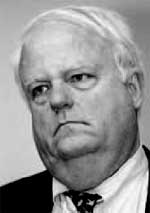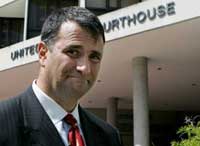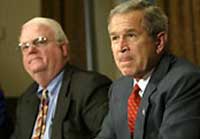House
Judiciary chairman met with terrorist banker tied to GOP lobbyist Abramoff
www.stewwebb.com
Rep.
James Sensenbrenner’s conflicts of interest prevent Bush impeachment inquiry
after meeting in Dubai with al Qaeda financier who hired Greenberg Traurig
lobbyist Jack Abramoff and pledging to support spread of Islamic banking in
U.S.
by Tom Flocco
www.tomflocco.com
 |
|
Jim
Sensenbrenner
|
Washington—April
26, 2006—TomFlocco.com—According to congressional finance records
filed on May 12, 2005 for the year 2004, House Judiciary Committee Chairman F.
James Sensenbrenner (R-5-WI) met with Al Shamal Islamic Bank founding member
and shareholder Saleh Kamel whose bank was co-founded by terrorist leader
Osama bin Laden who invested $50 million in the Khartoum, Sudan institution.
The fourteen-term Wisconsin Republican met with the court-alleged terrorist
financier even though news reports and court testimony indicated that Al
Shamal Bank was used to funnel terrorist money for the August 7, 1998 bombings
of U.S. embassies in Kenya and Tanzania and court records listed Kamel’s
questionable ties in the 2002 “Golden Chain” of terrorism finance report
presented in federal court by U.S. prosecutors.
According to sources familiar with several grand jury probes overseen by
Special Prosecutor Patrick Fitzgerald, Sensenbrenner is currently under
federal investigation regarding links to indicted Republican lobbyist and Bush
“pioneer” fundraiser Jack Abramoff who was employed by Saleh Kamel to
lobby U.S. legislators to expand the reach and money flow of Islamic banks
within the United States banking system.
On April 4-9, 2004 Chairman Sensenbrenner accepted an all-expense paid trip to
Bahrain and Dubai to speak at a conference organized by Saleh Kamel and funded
by the Islamic Free Market Institute, the conflicts of which may explain why
he is blocking an impeachment inquiry sought by 33 House members regarding
illegal spying on the American people, misleading the U.S. into the Iraq War,
immigration failures and evidence linking the government to the September 11
attacks among other issues.
As Judiciary committee chairman with jurisdiction over bills of impeachment,
the Wisconsin Republican and heir to the Kimberly-Clark paper fortune has the
power to authorize a committee vote for an inquiry into whether there is
sufficient evidence to impeach President Bush, after which articles of
impeachment could be voted upon and sent to the full House as members have
signed on to Judiciary Committee Ranking Member John Conyers’ resolution to
create a select committee for that purpose.
Despite Sensenbrenner’s interest in Islamic banking, it was his
pre-indictment protection of Abramoff and ties to Kamel and Dubai—the recent
subject of a public firestorm over the Bush administration’s attempt to sell
control of U.S. ports to Dubai Ports World Corporation in the United Arab
Emirates (UAE)—which is drawing the attention of prosecutors who are
reportedly investigating 30-40 legislators, their wives and staffers regarding
bribery and secret payoff trusts linked to Abramoff, according to U.S.
intelligence sources.
 |
|
Jack
Abramoff
|
Abramoff’s
lists of fundraisers at Greenberg-Traurig law firm include 72 events for
members of Congress between 1999 and 2003, with all but eight put on for
Republicans—many in House leadership—some of which were reportedly
not filed and recorded as required by federal election laws which may have
already drawn the attention of federal prosecutors.
Kamel, a Forbes list billionaire, is the Chairman of the General Council for
Islamic Banks and Financial Institutions (GCIBFI) which hired Abramoff as a
registered Greenberg-Traurig lobbyist for Kamel’s GCIBFI on March 12,
2002—six months after the September 11 attacks.
Chairman Sensenbrenner would have been aware of the above, yet deemed it
beneficial to meet with a known terrorist banker in 2004 despite clear
evidence, congressional testimony and court cases delineating Kamel’s
multiple links—some provided earlier by one of the Chairman's own colleagues
in GOP congressional leadership.
The Gulf Daily News reported that Sensenbrenner wanted to gain a better
understanding of Islamic finance, the Hawalla system and controlling terrorist
financing while promising to work so “American regulations would not
unnecessarily hamper the growth of Islamic banking in the U.S.”
Senate Armed Services chairman links Saleh Kamel to financing terrorism
Two years prior to Sensenbrenner’s meeting with Kamel and coinciding with
the alleged terrorist banker’s March hiring of Abramoff, Bosnian police
searched the offices of Benevolence International Foundation in Sarajevo and
found a computer file labeled “Tareekh Osama,” or “Osama History”
containing scanned images of several documents, including one which listed
Saleh Kamel as one of the top 20 Saudi financial sponsors which was delivered
to the U.S. Embassy soon after the raids.
The list was presented by the U.S. government as Exhibit 5 in the Department
of Justice “Government’s Evidentiary Proffer Supporting the Admissibility
of Co-conspirator Statements” in the case, USA v. Arnaout on October 9, 2002
[02 CR 892], and federal officials said the document is “a list of people
referred to within Al Qaida as the “Golden Chain,” wealthy donors to
Mujahideen efforts.”
Kamel reportedly hired Abramoff to represent the Islamic banking consortium to
counter Treasury Department and FBI efforts to put an unwanted spotlight on
global terrorist financing which came out of Saudi Arabia and other countries
in the Gulf.
Sensenbrenner has not publicly testified regarding the link to Kamel who in
turn has ties to Al Shamal Bank, Abramoff and Greenberg Traurig—and whether
contributions from Kamel may have allegedly been laundered through Abramoff,
evidence of which may still be available for subpoena by federal officials.
Greenberg—Traurig
Law Firm and the Bush Administration
September 11 widow Ellen Mariani's step-daughter Lauren Peters, met with
attorney Daniel Bakinowski in the Boston office of Greenberg Traurig--a
Miami-based firm with several close links to both President George W. Bush and
his brother, Florida Governor Jeb Bush. A few months later, attorneys from
Massachusetts and New Hampshire helped Peters file a legal challenge to take
control of the late Louis Neil Mariani's estate, resulting in Mariani’s
inability to continue her pursuit of 9-11 government evidence.
Greenberg Traurig represented President Bush in the Bush-Gore 2000 Florida
election vote recount and a Greenberg attorney personally represents Governor
Jeb Bush. Greenberg Traurig hired the son of Supreme Court Justice Antonin
Scalia on election day 2000--after which Justice Scalia cast one of the
deciding votes which placed Bush in the presidency about seven weeks later;
and the Miami-headquartered firm partially funded and sponsored a delegation
to Israel of House-Senate Armed Services Committee members and government
contractors who witnessed and were briefed on interrogation resistance
procedures and torture techniques--according to an Army Major General.
Other relationships include Greenberg Traurig's legal representation of Bush
2000 in the Florida election recount, prominent administrative positions in
the Massachusetts 9/11 Fund also involving Bush family banking house Brown
Brothers Harriman, Greenberg's Alberto Jose Mora--appointed General Counsel of
the Department of the Navy and its Office of Naval Intelligence just 90 days
before the 9-11 attacks, and Greenberg's indicted Bush 2004
"pioneer" fundraiser and Washington lobbyist Jack Abramoff.
One of the lobbyists accompanying the Greenberg-funded congressional and
defense contractor delegation to Israel included Jack London, chairman,
president and CEO of CACI International Inc., an American defense contractor
firm implicated by U.S. Major General Antonio M. Taguba in the torture of
Iraqis at Abu Ghraib prison, according to a report leaked by Taguba. (Lebanon
Daily Star, 5-11-2004)
The Greenberg firm was fined $77,000 in 1998 for soliciting an illegal foreign
political donation from German citizen Thomas Kramer; and Greenberg partner
Marvin Rosen--Democratic National Committee (DNC) finance chairman- supervised
the activities of convicted fund-raiser and DNC vice-chairman of finance John
Huang who had to return half of the more than $3 million raised by Huang in
contributions from illegal foreign sources.
Kamel is also
chairman of Dallah al Baraka Group (DBG) which is accused of financing al
Qaeda and other extremist groups, particularly through Omar al Bayoumi who
provided money to two of the alleged 9-11 “hijackers,” and who was an
assistant to the Director of Finance for Dallah Avco, Kamel’s Dallah
subsidiary.
Russian intelligence has reportedly charged that Dallah al Baraka Bank was
used by a Saudi religious charity, Al-Haramain, to move funds to Islamic
terrorists tied to al Qaeda in Chechnya.
Senator John Warner (R-VA) testified in a post 9-11 hearing that “Al Shamal
Islamic Bank operations continue to finance and materially support
international terrorism and that there are indications that Osama bin Laden
remains the leading shareholder of that bank,” yet Chairman Sensenbrenner
met with Kamel in 2004 even though his GOP colleague publicly linked Al Shamal
bank to Kamel and bin Laden.
Ahmed al-Fadl, a finance manager for al Qaeda, testified at the 2001 U.S.
embassy bombings trial that Al Shamal Islamic Bank was the only bank in which
Osama bin Laden kept his funds, and that he paid all the members of his
terrorist network through this account.
Al Shamal Bank General Manager Mohammad S. Mohammad acknowledged in a
September, 2001 press release that Osama bin Laden had two accounts in the
bank which were opened on March 30, 1992 for Construction and Development
Ltd., a company the U.S. State Department says “works directly with Sudanese
military officials to transport and provision terrorists training.” [U.S.
District Court, Washington, DC, Jane Doe v. al Baraka Investment, Al Shamal
Islamic Bank et. al., Section 44]
Al Shamal Islamic Bank has repeatedly been used to fund criminal and terrorist
activities. A former bin Laden associate, Jamal Ahmed al-Fadl, testified
during the U.S. trial on the 1998 embassy bombings in Africa, that Osama bin
Laden and at least six al Qaeda operatives held bank accounts in Al Shamal
Islamic Bank under their real names. [Jane Doe v. al Baraka Investment, Al
Shamal Islamic Bank et. al, Section 46]
Sensenbrenner protecting Bush and Abramoff?
 |
Sensenbrenner
came under fire from his House Judiciary Committee ranking Democrat John
Conyers (D-14-MI) in a letter
to U.S. Inspector General Glenn A. Fine, available a Conyers’ website, a
copy of which was also sent to the House Judiciary Chairman.
Sources with knowledge of the Abramoff case told TomFlocco.com that
Sensenbrenner protected Abramoff and President Bush by failing to use his
Judiciary committee power to investigate the firing and removal of former
Acting United States Attorney for Guam and the Northern Mariana Islands,
Frederick A. Black.
Black was aggressively supervising a grand jury probe into Abramoff’s
criminal lobbying and bribery activities until President Bush abruptly demoted
him on November 19, 2002, potentially leaving the President and Chairman
Sensenbrenner open to future obstruction of justice charges for failing to
call for or order an investigation of the GOP lobbyist’s money laundering
and other criminal charges since the grand jury ceased its legal pursuit of
Abramoff after Mr. Bush’s action.
The United State Code under 18 U.S.C. 4 provides for prison sentences for
“whoever, having knowledge of the actual commission of a felony cognizable
by a U.S. court conceals and does not as soon as possible make known the same
to some judge or other civil or military authority under the United States,
shall be fined under this title or imprisoned not more than three years, or
both.”
Acting U.S. Attorney Black’s replacement, Leonardo Rapadas, was confirmed in
May, 2003 without any debate; and after taking office Rapadas recused himself
from a public corruption case involving Guam Governor Carl Gutierrez even
though the Bush Department of Justice (DoJ) and Sensenbrenner knew that a
confidential memo to DoJ officials revealed that the new U.S. attorney was a
cousin of one of the main targets in the Gutierrez case.
Sensenbrenner remained silent in his House Judiciary Committee oversight,
effectively compounding the cover-up of Abramoff scandals linked to Bush and
the GOP.
Impeachment conflicts and recusal while under investigation
Sensenbrenner’s conflicts of interest come into serious play because the
Judiciary Committee can quickly employ a simple majority vote to initiate an
impeachment inquiry into presidential treason, bribery or high crimes and
misdemeanors, and then vote to certify articles of impeachment (bills of
indictment) by another simple majority to be sent to the full House for
majority approval to commence a Senate trial to convict and remove President
Bush from office—again by a majority vote.
Only four of 23 Republican House Judiciary Committee members would have to
cross over and join 17 Judiciary Democrats for a 21-19 margin out of 40
members to vote articles of impeachment out of committee onto the House floor
to approve a Senate trial to remove Mr. Bush.
Absent public pressure, Sensenbrenner’s links to Kamel, an indicted Abramoff
and nascent obstruction of justice charges could ultimately force the
Wisconsin Republican to recuse himself from presiding over what could shortly
become a public impeachment furor should Bush’s polling statistics continue
to render his presidency inviable for governing as soldiers die in Iraq and
illegal aliens rush to cross the border into the U.S. seeking amnesty via
legislation sponsored by Senators John McCain and Ted Kennedy.
Tragically, Sensenbrenner’s strong public stance against illegal immigration
and amnesty may have been used to garner popularity while obstructing justice
and then blocking an impeachment inquiry linked to massive offshore money
laundering involving Abramoff, Bush and Congress, some of which reportedly
emanated out of Guam and the Northern Mariana Islands—but also Bank
Crozier in Grenada and its U.S. correspondent Riggs Bank in Washington are
also allegedly involved, among other financial entities.
Follow the money
Sensenbrenner’s reported $10 million personal fortune is also an issue since
there is substantial evidence that his $6.3 million stock portfolio has
increased as a result of his votes in Congress and in proportion to tens of
thousands received in campaign contributions from companies wishing to
purchase his political influence and vote—and in which he also owned stock.
For example, an online search indicated that the Economic Policy
Institute’s bulletin, “The High Price of Free Trade,” revealed that
between 1994 and 2002, Sensenbrenner’s state of Wisconsin lost 46,395 jobs
as a result of his support for the NAFTA free trade agreement.
An examination of the Judiciary Chairman’s stock portfolio also reveals that
Sensenbrenner has strong reason to vote in support of multi-national
corporations and free trade since virtually all of his election campaign
contributions to hold political power and the increase in his personal wealth
is tied up in huge stock positions with defense contractors, insurance
companies, investment houses, oil and energy firms, pharmaceutical
manufacturers and the telecommunications and healthcare industries.
Eyebrows could also be raised during his 28 years in office if voters in
Sensenbrenner’s district realize that he accepted thousands of dollars in
contributions from companies in which he owned large blocks of stock when he
was running for office unopposed—that is, with no challenger from another
political party.
The Wisconsin Republican’s votes against the U.S. military are staggering in
that he voted against a $213 million bill to fund veteran medical care (HR
2099—roll call 829), against a $250,000 life insurance policy for soldiers
in combat (HR 4200—roll call 193), against a $1,500 bonus for troops serving
in Iraq and Afghanistan (HR 3289—roll call 554), and against making the
earned income tax credit permanent for troops (HR 785—roll call 469) even as
his concentration of defense company stocks profited his portfolio immensely
from the wars in Iraq and Afghanistan.
While federal prosecutors may have interest in Congressman Sensenbrenner’s
relationship with an individual who financed world terrorism and then hired
Jack Abramoff to help foster the spread of Islamic banking and finance in
America, despite ties to illegal political campaign bribery and money
laundering, it is more likely that voters in his district could question
whether he was meeting with Saleh Kamel for the purpose of taking Abramoff’s
place as a lobbyist for Islamic banking in order to further enhance his stock
portfolio and personal fortune after leaving office.
Mary Schneider [ www.MarySchneider.us
] contributed additional research for this report.
www.tomflocco.com
www.stewwebb.com


